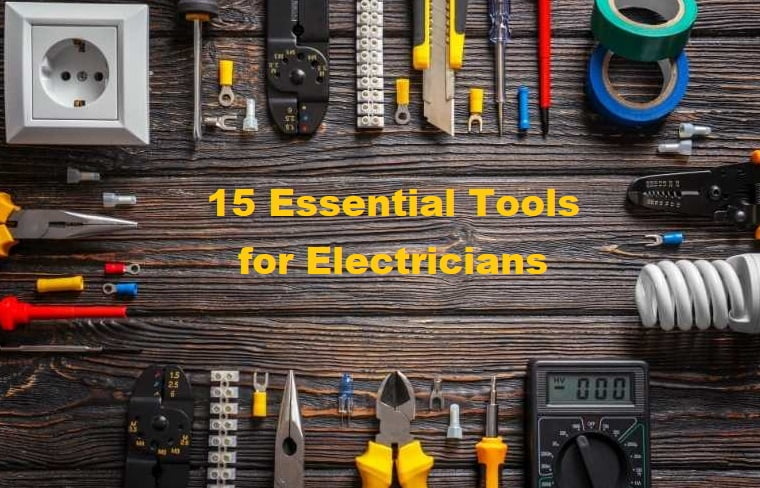15 Essential Tools for Electricians
Introduction
Electricians play a crucial role in our modern world, ensuring that we have reliable access to electricity for our homes, businesses, and industries. To carry out their work effectively and safely, electricians rely on a variety of specialized tools. In this article, we will explore 15 essential tools that every electrician should have in their toolbox.
Essential Tools for Electricians

1. Screwdrivers
Screwdrivers are fundamental tools for electricians. Flathead and Phillips head screwdrivers come in various sizes, enabling electricians to loosen or tighten screws on outlets, switches, and electrical panels.
2. Wire Strippers
Wire strippers are used to remove the insulation from electrical wires. Electricians need different sizes to accommodate various wire gauges and ensure proper connections.
3. Pliers
Needle-nose pliers and lineman’s pliers are indispensable for bending, cutting, and twisting wires. They provide a strong grip and are essential for manipulating electrical components.
4. Wire Cutters
Wire cutters are necessary for trimming and cutting wires to the desired length. They come in various types, including diagonal cutters and cable cutters, for different wire thicknesses.
5. Voltage Tester
A voltage tester, such as a non-contact voltage tester or a multimeter, helps electricians detect the presence of electrical current and measure voltage levels, ensuring safety during electrical work.
6. Circuit Tester
Circuit testers, like circuit tracers and continuity testers, help electricians diagnose electrical issues, locate breaks in circuits, and identify faulty components in a circuit.
7. Fish Tape
Fish tape is used to pull wires through conduits, walls, and ceilings, making it easier for electricians to route and install new wiring.
8. Conduit Benders
Conduit benders are essential for shaping electrical conduit, ensuring that it follows the correct path and angles, as required by electrical codes.
9. Tape Measure
Electricians need a tape measure to measure distances accurately, helping them plan and install electrical components in the right locations.
10. Cable Ties and Conduit Straps
Cable ties and conduit straps keep wires and cables organized and secure, reducing the risk of accidents and maintaining a tidy work environment.
11. Nut Drivers
Nut drivers are used to tighten and loosen nuts on electrical devices and components. They come in various sizes to fit different fasteners.
12. Wire Connectors
Wire connectors, such as wire nuts and twist-on connectors, are crucial for safely joining electrical wires and ensuring good electrical conductivity.
13. Conduit Reamers
Conduit reamers are necessary for smoothing the edges of conduit pipes after cutting, ensuring that wires can be pulled through without damage.
14. Safety Gear
Electricians must prioritize safety, so essential safety gear includes PPE; insulated gloves, safety glasses, hard hats, and fire-resistant clothing to protect against electrical shocks and other hazards.
15. Toolbox
A sturdy and organized toolbox is essential to keep all these tools readily accessible and in good condition. Electricians often rely on tool belts and pouches for easy access to frequently used items.
FAQs
-
What tools are essential for electricians?
Answer: Essential tools for electricians include screwdrivers, pliers, wire strippers, voltage testers, wire cutters, and more.
-
What are the names of electrician tools?
Answer: Electrician tools include screwdrivers, pliers, wire strippers, voltage testers, wire cutters, nut drivers, and conduit benders.
-
What is the most important electrical tool?
Answer: The most important electrical tools are often considered to be voltage testers and wire strippers, as they ensure safety and accurate wire preparation.
-
What are electrical workshop tools?
Answer: Electrical workshop tools encompass a wide range of tools used by electricians for installation, repair, and maintenance of electrical systems.
-
What are common power tools?
Answer: Common power tools for electrical work may include drills, saws, and power screwdrivers for various tasks.
-
What are the names of man tools?
Answer: The term “man tools” is not standard terminology. It’s possible you’re referring to hand tools commonly used by individuals for general purposes, which include hammers, pliers, wrenches, and screwdrivers.
-
What is manual hand tools?
Answer: Manual hand tools are handheld devices operated by physical effort, such as screwdrivers, hammers, and pliers.
-
What are the 4 driving tools?
Answer: The “4 driving tools” is not a standard category. It could refer to tools used for driving screws, nails, or fasteners, which may include screwdrivers, hammers, drills, and impact drivers.
-
Why are electrical tools important?
Answer: Electrical tools are important because they enable safe and efficient electrical work, helping prevent accidents, ensuring proper connections, and maintaining electrical systems.
Conclusion
Electricians perform vital work that ensures we have access to the power we need every day. To do their job effectively and safely, they rely on a set of essential tools. Whether you’re a professional electrician or a DIY enthusiast, these 15 tools should be in your toolbox to handle electrical tasks with confidence and precision. Safety, accuracy, and organization are key to success in the world of electrical work, and these tools are indispensable for achieving those goals.
 Electrical Engineering World Wiring a Brighter Tomorrow!
Electrical Engineering World Wiring a Brighter Tomorrow!